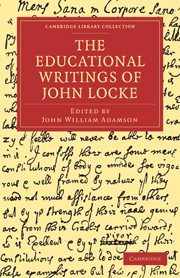OF THE CONDUCT OF THE UNDERSTANDING
Published online by Cambridge University Press: 07 September 2011
Summary
Apart from punctuation, the text here followed is that of vol. iii. in the ten-volume edition of Locke's “Works” 1812.
“Quid tam temerarium tamque indignum sapientis gravitate atque constantia, quam aut falsum sentire, aut quod non satis explorate perceptum sit, et cognitum, sine ulla dubitatione defendere?”
—Cicero, De Natura Deorum, i.1. Introduction.—The last resort a man has recourse to, in the conduct of himself, is his understanding: for though we distinguish the faculties of the mind, and give the supreme command to the will, as to an agent, yet the truth is, the man, who is the agent, determines himself to this or that voluntary action, upon some precedent knowledge, or appearance of knowledge, in the understanding. No man ever sets himself about anything but upon some view or other, which serves him for a reason for what he does: and whatsoever faculties he employs, the understanding, with such light as it has, well or ill informed, constantly leads; and by that light, true or false, all his operative powers are directed. The will itself, how absolute and uncontrollable soever it may be thought, never fails in its obedience to the dictates of the understanding. Temples have their sacred images, and we see what influence they have always had over a great part of mankind. But in truth, the ideas and images in men's minds are the invisible powers that constantly govern them, and to these they all universally pay a ready submission. It is therefore of the highest concernment that great care should be taken of the understanding, to conduct it right in the search of knowledge, and in the judgments it makes.
- Type
- Chapter
- Information
- The Educational Writings of John Locke , pp. 181 - 265Publisher: Cambridge University PressPrint publication year: 2011First published in: 1922
- 2
- Cited by

